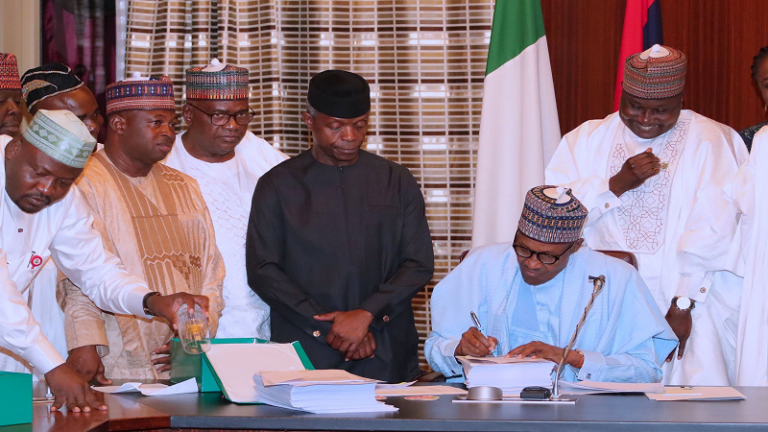
On Wednesday, the senate approved $16,230,077,718 and €1,020,000,000 loans requests made by Nigerian President Muhammadu Buhari, broadening the country’s debt profile that has riled up criticism recently.
The upper legislative chamber also approved grant components of $125 million.
Nigeria’s debt profile has accelerated following the decline in oil revenue, the country’s main source of GDP (gross domestic products). Buhari’s administration has relied largely on loans to fund budgets as the government’s purse depletes.
Register for Tekedia Mini-MBA edition 19 (Feb 9 – May 2, 2026): big discounts for early bird.
Tekedia AI in Business Masterclass opens registrations.
Join Tekedia Capital Syndicate and co-invest in great global startups.
Register for Tekedia AI Lab: From Technical Design to Deployment (next edition begins Jan 24 2026).
The recent loan request is captured in the 2018-2020 borrowing plan that the government said is geared toward infrastructural and economic development.
The chairman of the senate committee on local and foreign debts, Clifford Ordia, said on Wednesday, that the ongoing projects contained in the loan request, are covered in the 2018-2020 borrowing plan and will result in infrastructural development as well as poverty alleviation.
“The projects will stimulate a rebirth of commercial and engineering activities and the consequent tax revenues payable to Government as a result of these productive activities will increase.
“It will be recalled that the senate at plenary in July 2021 approved financing for projects as recommended by the Committee above whilst the Committee continued further legislative action and consideration of the outstanding request.
“Subsequently, on the 15th of September 2021, the President of the Senate of the federal republic of Nigeria read another Communication from the President and Commander in Chief of the Armed Forces, Containing an addendum to the 2018-2020 External Borrowing (Rolling) Plan in the sum of $4,054,476,863, €710,000,000 and Grant Component of $125,000,000 for various projects and same was also referred to the committee for further legislative action.
“The committee notes that a good number of the projects in respect of which financing is being requested under the 2018-2020 external borrowing (rolling) plan are mostly ongoing projects and programmes in respect of which external borrowed funds have been spent in the past, including loans and grants.
“The committee found as a fact that out of a sum of over $22.8billion approved by the national assembly under the 2016-2018 external borrowing rolling plan, only $2.8billion, that is 10% has been disbursed to Nigeria.
“The committee observes that these projects, some of which require additional financing, will have a great multiplier effect on stimulating economic growth through infrastructure development, job creation, poverty alleviation, health care and improve our security architecture,” he said.
The external and domestic borrowing requests have been approved by the senate in addendum to the 2018-2020 borrowing plan. In July, the national assembly approved the sums of $8.3 billion and €490 million loans as initial requests from the plan.
The lenders have been the World Bank, African Development Bank, the French Development Agency (AFD), Islamic Development Bank, China-Exim Bank among others.
While Buhari and the Senate have justified the loans, saying they would stimulate the economic growth and create jobs, experts are concerned that the rising debt profile may mortgage the future of young Nigerians.
As of June 30, Nigeria’s public debt stock was at N35.465, trillion, (about $90 billion), according to data from Debt Management Office. This means, each Nigerian owes more than N157,907 or [using official rate] around $400, which is considered unsustainable in a country where over 40% of the people live on less than $2 daily.
The budget implementation report presented by Minister of Finance, Budget & National Planning, Mrs Zainab Ahmed in July, noted that the federal government spent 98% (N1.8 trillion) of the total revenue generated in the first five months of 2021 on debt servicing.
Against this backdrop, concerns are heightening that things could deteriorate. Critics say the economic and infrastructural development powered by the loans are not measuring up to the negative impact it is yielding.



